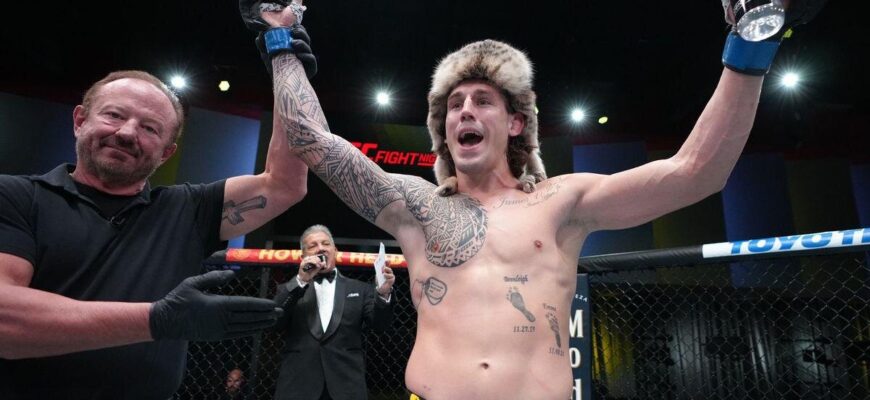The Octagon, often a crucible of raw emotion and physical exertion, sometimes reveals its most compelling narratives not during the fight itself, but in the immediate aftermath. At UFC 318 in New Orleans, Brendan Allen delivered a performance that left little doubt about his dominance over Marvin Vettori. Yet, it was his post-fight reflections, delivered with a blend of candor, empathy, and stern resolve, that truly captured the essence of a modern fighter navigating the complex landscape of professional combat.
Beyond the Bell: Squashing Beef and Showing Humanity
In the lead-up to any significant bout, a certain level of verbal jousting is almost obligatory. The contest between Allen and Vettori was no exception, laden with the usual pre-fight banter that fuels fan anticipation. However, once the final bell rang and Allen emerged victorious, his immediate focus shifted from antagonism to a surprising display of humanity. Addressing reporters, Allen recounted his post-fight interaction with Vettori, making it clear that the animosity was strictly confined to the competitive arena.
“I just told [Vettori] our problems aside, my heart goes out to him and his family,” Allen stated, offering a poignant explanation. He referenced Vettori`s personal tragedy – the profound loss of his brother – drawing a parallel to a difficult experience with his own sibling. This moment of shared vulnerability, however brief, underscored a seldom-seen side of the sport: the ability for fierce competitors to acknowledge a common humanity, even amidst the most brutal of professions. It was a stark reminder that beneath the warrior persona often lies a complex individual capable of profound empathy.
The Unsolicited Wisdom: A Confrontation with Coaches
While the reconciliation with Vettori demonstrated Allen`s maturity, not all post-fight interactions were as cordial. The immediate aftermath saw an unwelcome intervention from Vettori’s coaching staff. In a scenario familiar to many competitive environments, individuals on the periphery, perhaps fueled by the heat of the moment or a perceived slight, interject themselves into situations where their input is neither sought nor appreciated.
Allen, ever the pragmatist, minced no words: “His coaches started talking shit and I told them, `Get the f*ck out of my face.` It’s just people sticking their nose in between two grown men.” This blunt dismissal, devoid of any discernible regret, highlighted Allen’s clear boundary: the fight was between him and Vettori, and external interference was simply an unprofessional distraction. It’s an interesting paradox in combat sports – coaches are integral to preparation, yet sometimes their post-fight zeal can inadvertently undermine the very professionalism their fighters embody. One might even suggest it’s an instance of misplaced passion, an echo chamber of sideline intensity that fails to acknowledge the principal actors have already settled their differences.
Home State Advantage and Professional Pragmatism
Fighting in one`s home state carries a unique weight, a blend of immense pride and added pressure. For Allen, competing in Louisiana was undoubtedly an emotional affair. The roar of a hometown crowd, the familiar faces, and the deep-seated connection to the locale can amplify both the highs of victory and the lows of defeat. Yet, despite these profound personal stakes, Allen maintained a remarkably pragmatic view of the sport.
“I’m a grown man with kids, it’s just business to me,” he asserted. This perspective, while perhaps appearing dispassionately objective to an outsider, is a testament to the mental fortitude required to succeed at the highest levels of MMA. For elite athletes, the personal animosities are often temporary, manufactured for promotion or fleeting in the heat of battle. The ultimate goal remains the professional advancement, the victory, and the continuation of a demanding career. Once the work is done, the personal aspect is set aside, allowing for a clearer focus on future challenges rather than lingering grudges.
Conclusion: A Lesson in Post-Fight Deportment
Brendan Allen’s performance at UFC 318 extended beyond his dominant win. His post-fight commentary offered a masterclass in professional deportment within the volatile world of mixed martial arts. It demonstrated that true strength lies not just in physical prowess, but in the capacity for empathy, the clarity to set boundaries, and the discipline to view a brutal sport through a lens of pragmatic professionalism. As the dust settles on another electrifying UFC event, Allen`s measured victory and unfiltered truth serve as a compelling narrative, reminding us that sometimes, the most insightful moments occur not during the main event, but in the quiet, honest words of a fighter reflecting on a job well done.







